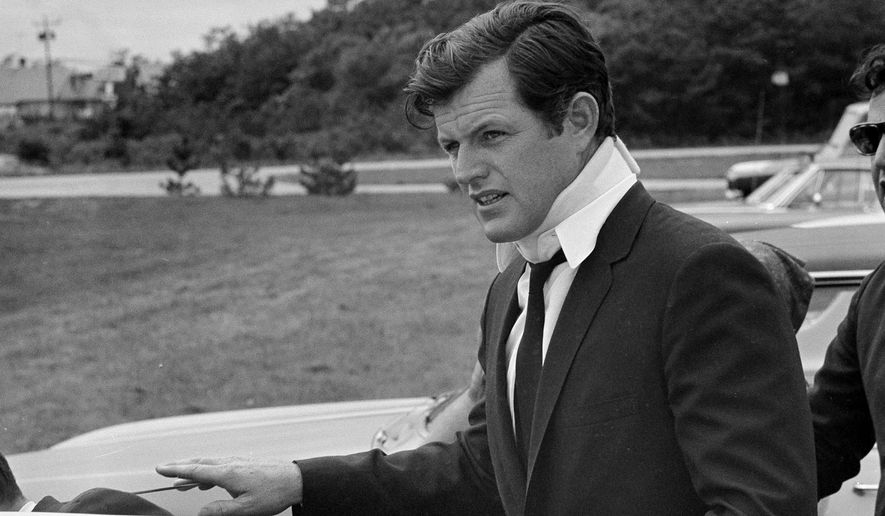ANALYSIS/OPINION:
Seeing is believing; and I have seen Hollywood’s account of the late Sen. Ted Kennedy’s infamous tragic accident at Chappaquiddick and his “indefensible” actions (Kennedy’s word, not mine) in the aftermath. It is exceptionally well done<https://youtu.be/i9SCbC6HDEU>, and not at all what one would expect from Hollywood’s liberal, self-indulgent and condescending lecturers.
Whether coincidence or not, “Chappaquiddick,” produced by Entertainment Studios, premieres April 6th against a backdrop of high-profile sex scandals - both in Hollywood and in Washington, D.C. It does not go unnoticed that Kennedy was a forerunner of Harvey Weinstein, Kevin Spacey, Louis C.K., and members of Congress who went so far as to actually legislate their antics into the vacuum of anonymity, only to have such a process blow up in their faces.
The notorious “shush fund,” from which taxpayer money was distributed to alleged victims of sexual misconduct by senators, House members and staff to buy their silence, was instituted in 1997, when Kennedy was well into his fourth decade in office. History does not record his feelings on the matter.
Recent news stories note “powerful people” have attempted to block this film’s release. Among them, reportedly, is former Sen. Chris Dodd, Connecticut Democrat, who, until last fall, was president of the Motion Picture Association of America. It’s not difficult to wonder why.
Mr. Dodd and Kennedy were more than longtime friends, they were drinking and carousing buddies who - all too often - engaged in a fair number of sexcapades that were mostly ignored by the national media because they were “liberal lions “of the Senate. A devastating 1990 profile of Kennedy in GQ was a rare exception.
The great public service done by “Chappaquiddick” is that it strips away the decades-long myth perpetuated by the Kennedy family and its allies in national media, academia and, yes, in Hollywood. Lead actor Jason Clarke, by an odd coincidence, happens to have been born on July 17, 1969 in Australia, just one day before the incident happened on the other side of the world at Chappaquiddick. Mr. Clarke did not grow up with the Camelot myth, and so does a remarkable job capturing Ted Kennedy’s petulant, spoiled, self-indulgent, self-pitying and self-destructive persona.
The movie cuts directly from Mary Jo Kopechne (played by Kate Mara) gasping for air inside a car rapidly filling with water, to a whimpering Kennedy on the shore of Poucha Pond. He walks back to the island beach house - from which he and Kopechne had left a party - and upon arrival his first words to the first person he tells about the incident - cousin and Kennedy family fixer Joe Gargan - are, “I’m not going to be president.”
Kennedy had been preparing for a White House run in 1972 in the aftermath of his brother Bobby’s assassination in 1968. He was Senate majority whip at the time - July 1969 - and many Kennedy advisers and supporters believed he could easily play on the sympathy the American people had for the Kennedy family and the tragedies they had suffered.
The Ted Kennedy we see in “Chappaquiddick” is obsessed with preserving his political viability, as is the small contingent of Kennedy advisers and consultants convened by his father, Joseph Kennedy (played brilliantly by Bruce Dern, who could well be nominated for best supporting actor). The father, despite being left almost completely paralyzed by a recent stroke, still waves his patriarchal hand to command the faithful to rally ’round his son and help him in spite of himself. The fixers do their job and ensure the youngest Kennedy son avoids any legal trouble; he pleads guilty to leaving the scene of an accident and avoids any jail time.
But there is one fixer with a conscience: it’s Gargan (in an unusual but inspired bit of casting, played by “Daily Show” alumnus Ed Helms). Throughout the movie this one outlier among the keepers of the family flame acts as Kennedy’s external conscience, imploring Kennedy to accept accountability for this tragedy and resign from his Senate seat.
Kennedy strings his cousin along, even to the point of preventing his cousin’s departure from the fold by tasking him with drafting a resignation speech knowing all too well he has no intention of giving it. Instead, before a live prime-time television audience, Kennedy assigns his cousin the role of cue-card holder, and reads instead another speech drafted by Ted Sorensen, a speechwriter and adviser to his older brother, John F. Kennedy.
The speech is delivered with a false humility so persuasive that you find yourself thinking Kennedy has actually convinced himself that he’s the victim in this sordid episode. The gambit works with his constituents; the voters of Massachusetts re-elect Kennedy for decades until his death in 2009. He served 47 years, during which he arguably shepherded some of the most destructive legislation ever passed by Congress.
If Chappaquiddick had happened today, it would be hard to see how a powerful man, no matter how liberal politically, would survive. But the movie emphatically reminds us how intoxicating and effective power and privilege can be, and serves as a warning that even today we are vulnerable to being seduced by the potent mixture of politics and celebrity. Highly recommended.




Please read our comment policy before commenting.